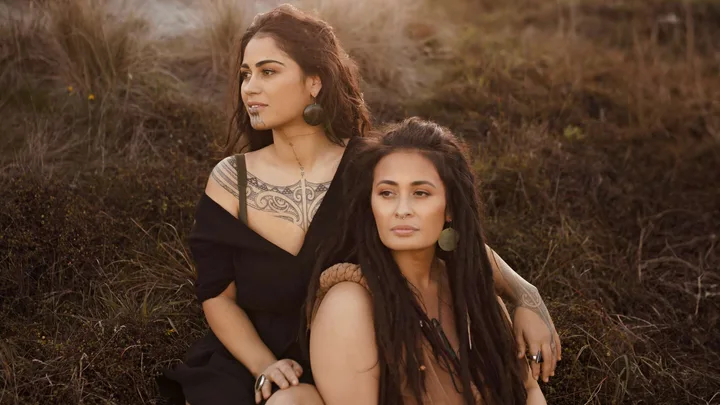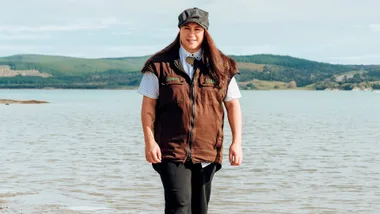When Jasmine Brown wakes in the morning to her children running in calling out “Mōrena” (morning), all feels right in the world.
On her Āwhitu Peninsula village, four generations of her whānau, including husband Pineamine, 29, her children, seven siblings, parents and grandparents are all living harmoniously on their shared land.
Together they homeschool, grow their own food, raise animals and turn to nature for medicinal remedies in a bid to reconnect to a more ancestral way of living.
“I feel as though it’s a rich life. When I go to sleep, everyone I love is with me,” shares Jasmine, 28. She’s mum to four children aged eight, seven, four and 10 months old. “Every morning, the tamariki [children] are bursting through the doors with vibrancy. It’s just so full of life and love, and I wish everyone could experience that depth of connection with their whānau.”
Meanwhile, two hours away in Waihi, best friend Wikitoria Kautai-King’s mornings look almost identical after building her own intergenerational land with her māmā Dale and pāpā David, husband Sheyenne, 33, their three children aged 12, two and five months old, and her two brothers Daniel and Kale.

“My māmā and pāpā wanted to strip right back to simply grow alongside their mokopuna [grandchildren],” explains Wikitoria, 32.
“Going out to Jasmine’s whenua [land] and observing them made us see it was possible.”
The tight-knit friends first connected online in 2020 over a shared love of organic gardening.
“We’re not blood sisters but we’re definitely chosen whānau,” smiles Wikitoria.
It wasn’t long before they had made a deep commitment to each other and their whakapapa [family lineage] to step away from the fast-paced modern life, returning to a more traditional and self-sufficient way of living.

This means everyone has a role to play. The men are in the garden before sunrise each morning. The kids look after their cow, and they later make its milk into butter, cheese, and yoghurt. We live life according to the maramataka (Māori lunar calendar).
The duo are raising 11 children between them (four are Jasmine’s younger siblings). They explain every day is different as they explore their children’s interests, learning about flax weaving, Māori instruments and art.
“Every child is rongoā [medicine] for this earth,” says Wikitoria. Before motherhood, she was studying and working as a lifeguard in South Auckland. “It’s up to us as kaitiaki [guardians] to nurture their gifts.”
In Wikitoria’s whānau, her māmā is a traditional Māori weaver. She also holds pregnancy and birth workshops, her pāpā works in corrections and her grandfather is a community firefighter.

Jasmine, alongside her steppāpā Wynn James, helps at the local school sharing kaupapa Māori (customary practices) and knowledge with the students.
The men in Jasmine’s whānau together run land-care business Tiaki Whenua Ltd, which focuses on native plant regeneration.
And Jasmine and Wikitoria nourish their other love, rongoā Māori (traditional medicinal practices) through their business Ukaipo Native Apothecaries. Using homegrown plants and ancient knowledge, the pair create organic herbal elixirs.
“Rongoā isn’t just native plant medicine, it’s our way of life. It’s how we live, grow and nourish, and our connection to the earth and honouring all her sacred rhythms,” smiles Wikitoria. A desire for her tamariki to grow up connected to their culture drives her.

Jasmine says domestic violence distorted her own childhood. But there was constant, unwavering love, support and a sense of safety from her mum Keri and grandparents Doug and Louise.
“When I had my tamariki, I decided I wasn’t going to put them in situations that I’d been exposed to,” tells Jasmine. “My koro [grandparents], māmā and our whānau have made that possible. I watched my mum transform her life and I wanted that too.
“She’s been my biggest inspiration as a māmā. So, we decided to create our communal living together, built by the loving, hardworking hands of my grandfather Doug.”
Both Jasmine and Wikitoria’s land are set up with shared spaces and gardens. It paints an idyllic picture, but the friends, who refer to each other as “sissy”, laugh, admitting it can be a little chaotic.
“If you’re not used to noise and come to our whare [house], it tends to be a little overwhelming. Chickens inside and tamariki wild,” says Jasmine. “But it feels so wholesome and is what we call our peace.”
Help is here
Women’s Refuge Crisis line – 0800 733 843 (0800 REFUGE), or visit womensrefuge.org.nz.
 Photography by Ria
Photography by Ria



